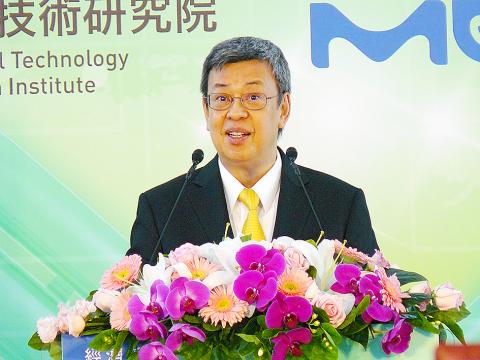The government has set sights on biotechnology as the nation’s next NT$1 trillion (US$33.6 billion) industry, Vice President Chen Chien-jen (陳建仁) said yesterday.
Biotechnology is part of the government’s efforts in industrial innovation, which is at the top of President Tsai Ying-wen’s (蔡英文) agenda for industrial restructuring to boost global competitiveness.
The “five plus two” industries refer to the government’s seven development projects aimed at transforming the nation’s economic and industrial structures, including projects related to the “Asian Silicon Valley” development plan, as well as the biotech, green energy, aviation, smart machinery and defense industries.

Photo: CNA
The production value of the local biotech industry stood at NT$315 billion in 2016, up from NT$298.6 billion in 2015, according to the Ministry of Economic Affairs.
Cultivating personnel in precision medicine, one of the fastest growing segment in the biomedicine in the past few years, would be crucial to the endeavor, Chen said in a speech at the inauguration of a research and development (R&D) and training collaboration program between the government’s Industrial Technology Research Institute (ITRI, 工研院) and Germany-based pharmaceutical and life science giant Merck KGaA.
ITRI and Merck in March signed a memorandum of understanding for program to set up an innovation campus at the institute’s Guangfu campus in Hsinchu.
The partnership, which is to continue for 18 months, is aimed at cultivating 120 high-end biotech professionals in one year.
Merck is to introduce manufacturing technologies for antibody-drug conjugates, helping Taiwanese companies prepare to meet stringent requirements and enter advanced international pharmaceutical markets.
Across the globe, major precision medicine initiatives have been launched, such as the UK’s 100,000 Genomes Project in 2014 to improve diagnostic technology through genome sequencing, and the US’ 21st Century Cures Act in 2016 to allow faster approval process to encourage innovation-oriented research in pharmaceuticals and medical devices, Chen said.
The ITRI’s Industrial Economics and Knowledge Center estimated the global precision medicine market at US$38.9 billion in 2015, with the market projected to see continued compound annual growth rate of 12.3 percent and reach US$69.5 billion in 2020.
Meanwhile, the TPEX’s Bio Index, which has become a hub for local biotechnology firms, has rallied from about 133 points at the beginning of this year to close at 156.07 points yesterday in Taipei trading.
Recent highlights for Taiwan’s biotech industry include TaiMed Biologics Inc (中裕新藥), whose HIV/AIDS treatment, Trogarzo, has begun sales in the US, while a number of health insurance carriers are anticipated to begin covering treatments, the company said last month.

RESILIENCE: Deepening bilateral cooperation would extend the peace sustained over the 45 years since the Taiwan Relations Act, Greene said Taiwan-US relations are built on deep economic ties and shared values, American Institute in Taiwan (AIT) Director Raymond Greene said yesterday, adding that strengthening supply chain security in critical industries, enhancing societal resilience through cooperation and deepening partnerships are key to ensuring peace and stability for Taiwan in the years ahead. Greene made the remarks at the National Security Youth Forum, organized by National Taiwan University’s National Security and Strategy Studies Institution in Taipei. In his address in Mandarin Chinese, Greene said the Taiwan-US relationship is built on deep economic ties and shared interests, and grows stronger through the enduring friendship between

EUROPEAN TARGETS: The planned Munich center would support TSMC’s European customers to design high-performance, energy-efficient chips, an executive said Taiwan Semiconductor Manufacturing Co (TSMC, 台積電), the world’s largest contract chipmaker, yesterday said that it plans to launch a new research-and-development (R&D) center in Munich, Germany, next quarter to assist customers with chip design. TSMC Europe president Paul de Bot made the announcement during a technology symposium in Amsterdam on Tuesday, the chipmaker said. The new Munich center would be the firm’s first chip designing center in Europe, it said. The chipmaker has set up a major R&D center at its base of operations in Hsinchu and plans to create a new one in the US to provide services for major US customers,

GAINING STEAM: The scheme initially failed to gather much attention, with only 188 cards issued in its first year, but gained popularity amid the COVID-19 pandemic Applications for the Employment Gold Card have increased in the past few years, with the card having been issued to a total of 13,191 people from 101 countries since its introduction in 2018, the National Development Council (NDC) said yesterday. Those who have received the card have included celebrities, such as former NBA star Dwight Howard and Australian-South Korean cheerleader Dahye Lee, the NDC said. The four-in-one Employment Gold Card combines a work permit, resident visa, Alien Resident Certificate (ARC) and re-entry permit. It was first introduced in February 2018 through the Act Governing Recruitment and Employment of Foreign Professionals (外國專業人才延攬及雇用法),

The Ministry of Transportation and Communications yesterday said that it would redesign the written portion of the driver’s license exam to make it more rigorous. “We hope that the exam can assess drivers’ understanding of traffic rules, particularly those who take the driver’s license test for the first time. In the past, drivers only needed to cram a book of test questions to pass the written exam,” Minister of Transportation and Communications Chen Shih-kai (陳世凱) told a news conference at the Taoyuan Motor Vehicle Office. “In the future, they would not be able to pass the test unless they study traffic regulations